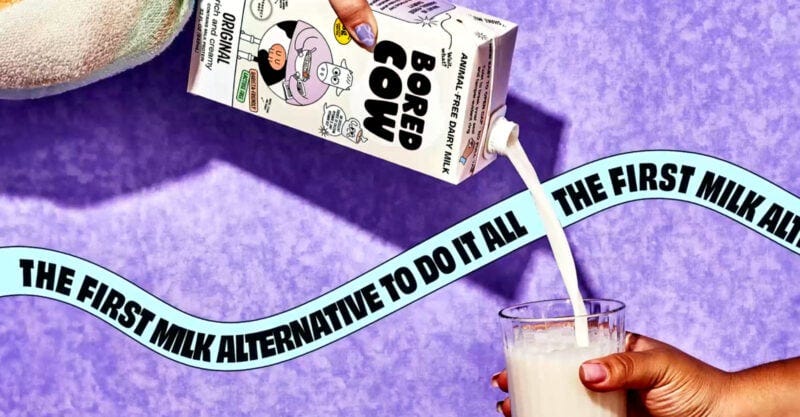Thanks to Alliance for Natural Health and The Defender for this article. It points out a crucial problem for all the newly proposed synthetic foods: they may be very bad for us, with molecules we have never eaten before. But it will take many years and maybe generations to find out. The same is true for the chemicals used in our current foods, which is why everyone is advised to eat whole, unprocessed foods. If you cannot pronounce the ingredients on a food label, you may not want to eat the food. Furthermore, ingredients that are present in very small quantities may not be listed, bt they can still hurt you. Even very tiny quantities, if you are allergic to them.
https://anh-usa.org/frankenfoods-v2-exploiting-the-bioequivalence-principle/
Bored Cow: Consuming This ‘Synbio’ Milk Could Be Hazardous to Your Health
Bored Cow, a cow and animal-free whey-containing, cultured milk, is one of a growing number of foods being produced through synthetic biology and “precision fermentation” — the health risks of which are largely unknown.
by Alliance for Natural Health USA
July 3, 2024
The top line:
Bored Cow, a cow and animal-free whey-containing, cultured milk, is one of a growing number of foods being produced through synthetic biology and “precision fermentation”— the health risks of which are largely unknown.
We’re told products like Bored Cow are fine — even desirable — because they’re biologically the same as their natural counterparts without the toll on the environment purportedly caused by livestock and dairy farming.
Yet the evidence indicates that these products are far from biologically equivalent, but regulators don’t seem to care.
Got Milk GE-yeast-fermented-whey-protein to drink?
You may have heard about the new “animal-free dairy milk” called Bored Cow. It’s being billed as a more animal and environmentally-friendly option to traditional milk that comes from a ruminant’s udders.
It all sounds great until you dig a bit deeper to learn that it is produced using synthetic biology (synbio), using genetically engineered (GE) yeast that is then put into a so-called “precision fermentation” system.
While the whey protein in it is the same as that found in cow’s milk, that’s only a small part of the overall story.
Emerging data from some scientists, like John Fagan from the Health Research Institute (HRI), says the fermentation isn’t as precise as claimed, and there are a lot of other compounds in the milk, some of which have never been recorded by science before.
That might mean that drinking Bored Cow “milk” on a daily basis could have unknown and potentially dangerous human health implications.
This might just be one product, but it matters because powerful special interests are working to make synbio the tech platform of our food system moving forward — where farms are replaced with fermentation tanks — in the name of protecting the environment.
What’s happening here is an effort to get consumers to believe they can enjoy all the flavor, mouth feel and nutrition of real cow’s milk…without the involvement of any cows (hence the “Bored Cow” name).
Bored Cow is made with whey protein produced through a process called “precision fermentation,” a form of synbio. This involves taking a gene for whey protein and inserting it into a GE yeast.
The yeast is put into fermentation tanks with other nutrients to help it grow. In the end, the GE yeast is supposed to be filtered out, leaving only the milk protein.
Bored Cow takes this protein and adds vitamins, minerals and other ingredients to mimic the taste, consistency and nutritional content of real cow’s milk.
Far from ‘bioequivalent’
The marketing hype behind Bored Cow starts falling apart when you learn that it’s not even close to being equivalent to real milk from pasture. HRI’s independent testing found 92 unknown compounds in this synbio milk.
Fagan, HRI’s chief scientist, said these compounds are “completely novel to our food … They are nutritional dark matter.”
The U.S. Food and Drug Administration (FDA) must be on top of this, right? Wrong. Bored Cow has not undergone safety testing at the FDA.
Perfect Day, the manufacturer of the synbio whey protein, determined it was “generally recognized as safe” (GRAS) and voluntarily notified the FDA of this determination; in response, the FDA said it had no questions.
Given how rife the GRAS process is with conflicts of interest, this is akin to taking the company’s word for it that its novel synbio whey protein is safe.
Nor is it very likely that Bored Cow is nutritionally equivalent to real milk. Just as meat is more than just protein, milk is far more than a simple combination of whey and various vitamins and minerals. Milkfat contains 400 different fatty acids.
Milk has two types of proteins, whey and casein — and there are several different types of these two proteins contained in milk and a whole bundle of other compounds like lactoferrin and bioactive peptides that help prime the immune system.
Does synbio milk have this nutritional complexity?
It doesn’t seem like it, as casein, to use just one example, which comprises 80% of the protein in cow’s milk, isn’t listed as an ingredient.
Further, according to HRI’s tests, the amino acid composition of Bored Cow is “strikingly different” than that of milk.
Laws not fit to purpose
Bored Cow is representative of a whole new generation of GE foods that are in development, some of which we’ve written about previously.
Older genetically modified (GM) foods were created by modifying the genome of a living plant by inserting, for example, an herbicide-resistant trait.
That was nothing compared to what’s going on now. GE yeast or fungi are being used as little factories to manufacture food components that regulators say are biologically equivalent to their natural counterparts, so, they say, no additional testing is required because the foods have been shown to be safe through their long history of consumption.
But, as we’ve seen, getting yeast to make one protein found in milk, fermenting it, then adding nutrients, and slapping “milk” on the label doesn’t make it milk. Nor, for that matter, is lab-grown meat biologically equivalent to pasture-raised meat.
And herein lies the problem. The entire framework for dealing with genetically engineered foods in the U.S. is fundamentally broken.
That’s because the federal government decided decades ago that the final product is all that matters, not the process used to create that product.
This was codified in the 1986 Coordinated Framework for the Regulation of Biotechnology, which was updated in 1992 and again in 2017.
Astoundingly, it wasn’t updated to install more robust safety measures to protect Americans from new and previously unthinkable forms of food.
It was updated in large part to remove or mitigate “unnecessary costs and burdens” that “limit the ability of technology developers” to “navigate the regulatory process” which also “hamper economic growth, innovation, and competitiveness.”
That is, the framework was updated to make it easier for the biotech industry to get their Frankenfoods onto our dinner plates!
We’re worried that what’s coming are further “updates” to this framework that allow GE foods and those developed using synbio technologies to be considered “bioequivalent” to their natural counterparts — in essence, drinking the lab-grown food industry’s Kool-Aid.
If regulators determine that synbio milk is equivalent to real milk, will consumers be allowed to make their own choices, or will we be sold out as we were with the sham GMO labeling law that allowed companies to hide the GM contents of their food in scannable codes?
Some countries are already moving in that direction: Costa Rica just adopted new regulations that treat a wide range of gene-edited products as equivalent to conventionally bred products. This is something we have to keep a keen eye on.
The advent of lab-grown meat, plant-based meat, and products like Bored Cow show how inadequate our current laws are in dealing with these foods.
Of course, it matters how these foods are made! CRISPR, the gene-editing technology, is known to produce unintended outcomes.
What evidence is there that eating food grown in laboratories from genetically modified yeast — food that is significantly different than the food we have evolved to eat over human history — is safe, much less healthy?
Put simply, the fake meat and milk synbio manufacturers are exploiting old rules never intended for synbio products so they can escape doing any safety testing before their products hit the market.
They’re using all-too-familiar revolving doors with the FDA to get their way, and they want to deceive us into thinking they’re saving the planet from those nasty, carbon dioxide-producing animals while offering us foods that are as safe and healthy as those produced on real farms with the help of real animals — without any of it.
We’re watching these developments closely, and we’ll alert you as soon as we see an opportunity to take political action on this critical issue.
In the meantime, please share this article widely, as we need a lot more awareness of how synbio makers are using the principle of “bioequivalence” to get their questionable foods into our mouths.
Originally published by Alliance for Natural Health USA.








I will never eat any of these fake foods! So far the farmers I buy from are against all this BS! I’ll stand with them no matter what! There is nothing better than raw milk, pastured grass fed beef, pork, chickens and eggs!! I am blessed to have found them the last 15 years!
I just saw a post on FB that Bill Gates-of-Hell is pushing maggot milk. They got milk out of those man-boobs?